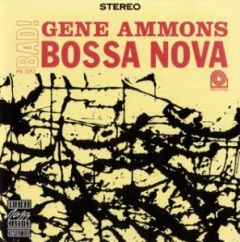Gene Ammons - Bad! Bossa Nova (1962)
Gene Ammons - Bad! Bossa Nova (1962)

1. Pagan Love Song (Nacio Herb Brown/Arthur Freed) 4:47
2. Ca'purange (Jungle Soul) (Mussapere) 9:36
3. Anna (Vatro/Giordano/Engvick) 3:22 play
4. Caé Caé (Roberto Martins/Berrios/Latouche) 3:47
5. Moito Mato Grosso (Gene Ammons) 7:45
6. Yellow Bird (Alan Bergman/Michael Keith/Norman Luboff) 5:05
Personnel:
Gene Ammons (Tenor Saxophone)
Bucky Pizzarelli (Spanish Guitar)
Kenny Burrell (Rhythm Guitar)
Hank Jones (Piano)
Norman Edge (Double Bass)
Oliver Jackson (Drums)
Al Hayes (Bongo)
"This was Ammons' final recording before 'being made an example of' and getting a lengthy jail sentence for possession of heroin; his next record would be cut over seven years later. The music is surprisingly upbeat, with Ammons joined by two guitars (Bucky Pizzarelli and Kenny Burrell), a fine rhythm section (pianist Hank Jones, bassist Norman Edge, and drummer Oliver Jackson), and the bongos of Al Hayes for a set of Latin-flavored jazz that was masquerading as bossa nova. The music is offbeat if not all that memorable, a decent effort but not essential." – Scott Yanow
Gene Ammons does not showcase a lot of fireworks on this album, in fact, his soul-jazz style playing here is a little bland at times, but the songs are so catchy and the groove is dead-on all the way through that it ends up being a nice record after all. "Anna" has a rollicking pop start to it, thanks to the acoustic guitars of Bucky Pizzarelli and Kenny Burrell. Hank Jones sets the slinky tone on "Moito Mato Grosso," and Al Hayes' bongo playing throughout makes "Bad! Bossa Nova" a lot of fun, even if it's more of a latin/soul fusion than a true bossa nova album. It's clear they were tying to cash in on the craze of the time, and Ammons served a 5 year jail sentence for heroin possession not long after this was recorded, but still and all it is a record worth picking up. –Jonathan J. Casey
Eugene "Jug" Ammons (April 14, 1925 – July 23, 1974) also known as "The Boss," was an American jazz tenor saxophonist, and the son of boogie-woogie pianist Albert Ammons. Ammons began to gain recognition when he went on the road with trumpeter King Kolax band in 1943, at the age of 18. He became a member of the Billy Eckstine and Woody Herman bands in 1944 and 1949 respectively,[1] and then in 1950 formed a duet with Sonny Stitt. His later career was interrupted by two prison sentences for narcotics possession, the first from 1958 to 1960, the second from 1962 to 1969. He recorded as a leader for Mercury (1947-1949), Aristocrat (1948-1950) and Chess (1950-1951), Prestige (1950-1952), Decca (1952), and United (1952-1953). For the rest of his career, he was affiliated with Prestige.
Ammons and Von Freeman were the founders of the Chicago School of tenor saxophone. His style of playing showed influences from Lester Young as well as Ben Webster. These artists had helped develop the sound of the tenor saxophone to higher levels of expressiveness. Ammons, together with Dexter Gordon and Sonny Stitt, helped integrate their developments with the emerging "vernacular" of the bebop movement, and the chromaticism and rhythmic variety of Charlie Parker is evident in his playing. While adept at the technical aspects of bebop, in particular its love of harmonic substitutions, Ammons more than Young, Webster or Parker, stayed in touch with the commercial blues and R&B of his day. For example, in 1950 the saxophonist's recording of "My Foolish Heart" made Billboard Magazine's black pop charts.[2] "The "soul Jazz" movement of the mid-1960s, often using the combination of tenor saxophone and Hammond B3 electric organ, counts him as a founder. Often using a thinner, drier tone than Stitt or Gordon, Ammons could at will exploit a vast range of textures on the instrument, vocalizing it in ways that look forward to later artists like Stanley Turrentine, Houston Person, and remarkably Archie Shepp. Ammons showed little interest, however, in the modal jazz of John Coltrane, Joe Henderson or Wayne Shorter that was emerging at the same time.
Some fine ballad performances in his oeuvre are testament to an exceptional sense of intonation and melodic symmetry, powerful lyrical expressiveness, and mastery both of the blues and the bebop vernacular which can now be described as, in its own way, "classical." "Answer Me, My Love" written by Fred Rauch, Carl Sigman and Gerhard Winkler, performed by Gene Ammons is featured on the soundtrack for Romance & Cigarettes (2005). Equipment: "Jug" played on a Bb Conn 10M Tenor Saxophone and a Brilhart Ebolin mouthpiece. Ammons is considered a major influence on the style of popular jazz tenor saxophonist Joshua Redman.
Ammons died in 1974, at the age of 49, after a battle with cancer.
download (mp3 @320 kbs):
uploaded yandex 4shared mediafire mega solidfiles cloudmailru filecloudio oboom
Zmieniony (Sobota, 01 Listopad 2014 16:30)








